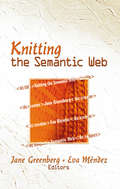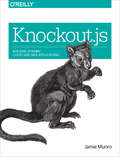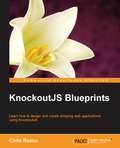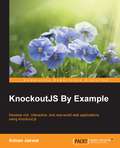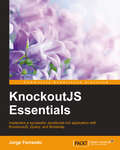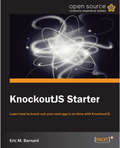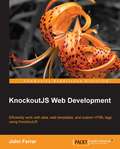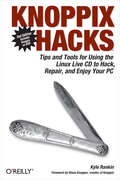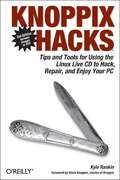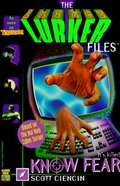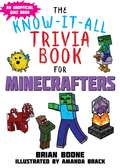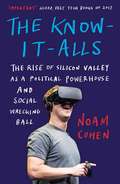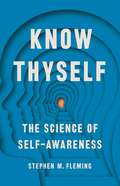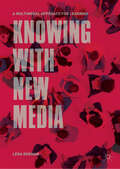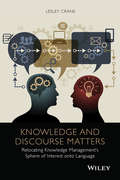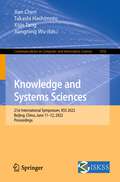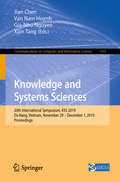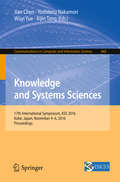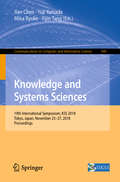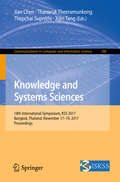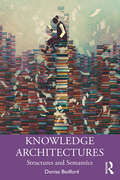- Table View
- List View
Knitting the Semantic Web
by Jane Greenberg Eva MéndezThe Semantic Web, extends the popular, day-to-day Web, enabling computers and people to effectively work together by giving information well-defined meaning. Knitting the Semantic Web explains the interdisciplinary efforts underway to build a more library-like Web through “semantic knitting.” The book examines foundation activities and initiatives leading to standardized semantic metadata. These efforts lead to the Semantic Web—a network able to support computational activities and provide people with services efficiently. Leaders in library and information science, computer science, and information intensive domains provide insight and inspiration to give readers a greater understanding of the evolution of the Semantic Web. Librarians and information professionals are uniquely qualified to play a major role in the development and maintenance of the Semantic Web. Knitting the Semantic Web closely examines this crucial relationship in detail. This single source reviews the foundations, standards, and tools underlying the Semantic Web and presents thoughtful perspectives in the context of 2.0 developments. Many chapters include figures to illustrate concepts and ideas, and the entire text is extensively referenced. Topics in Knitting the Semantic Web include: RDF, its expressive power, and its ability to underlie the new Library catalog card for the coming century the value and application for controlled vocabularies SKOS (Simple Knowledge Organization System), the newest Semantic Web language managing scheme versioning in the Semantic Web Physnet portal service for physics Semantic Web technologies in biomedicine developing the United Nations Food and Agriculture ontology Friend Of A Friend (FOAF) vocabulary specification—with a real world case study at a university Web/Library 2.0 and more Knitting the Semantic Web is a stimulating resource for professionals, researchers, educators, and students in library and information science, computer science, information architecture, Web design, and Web services.
Knockout.js
by Jamie MunroUse Knockout.js to design and build dynamic client-side web applications that are extremely responsive and easy to maintain. This example-driven book shows you how to use this lightweight JavaScript framework and its Model-View-ViewModel (MVVM) pattern. You'll learn how to build your own data bindings, extend the framework with reusable functions, and work with a server to enhance your client-side application with persistence. In the final chapter, you'll build a shopping cart to see how everything fits together.If you're a web developer with experience in JavaScript, HTML, and CSS, you're ready for Knockout.Learn how to create a ViewModelBind HTML data and attributes, and CSS classes and stylesUnderstand data binding in Knockout's context hierarchyUse properties that change dynamically through user interactionWork with forms by using several different bindingsBind multiple ViewModels on a single pageExtend or attach custom functions to observablesPerform server-side interactions with jQueryMap a JavaScript object or apply JSON data to a new object
KnockoutJS Blueprints
by Carlo RussoIf you are a JavaScript developer and already know the basics of KnockoutJS and you want to get the most out of it, then this book is for you. This book will help in your transition from a small site to a large web application that is easily maintainable.
KnockoutJS by Example
by Adnan JaswalDevelop rich, interactive, and real-world web applications using knockout.js About This Book * Master the full range of features provided by knockout.js such as declarative binding, automatic refresh, dependency tracking, and templating using this project based guide * Tackle real-world problems such as page navigation, forms, composite UI components, maps integration, server interaction for CRUD operations, and application security * Discover the power of knockout.js as you build applications with complexity ranging from beginner to advanced * Extend and customize knockout.js to harness its full potential * Integrate with third party libraries and APIs to build fully featured applications Who This Book Is For This book is intended for designers and developers who want to learn how to use Knockout to develop rich, interactive, and modular web applications. The book assumes no prior knowledge of the Knockout library but basic familiarity with HTML, CSS, and JavaScript would be helpful. What You Will Learn * Explore the basic concept behind the Model-View-View Model (MVVM) design pattern and how it is implemented by Knockout * Develop a modular application skeleton based on the module pattern that can be used as a template for your projects * Create single page, rich, interactive, modular, real-world applications using Knockout * Use knockout.js with other libraries and APIs such as JQuery, Bootstrap, and Google Maps API to give your users a richer experience * Create a real-world dynamic web form to capture user information and learn how Knockout makes it easier to capture, validate, and submit form data * Develop and use dynamic UI components such as grids, tabs, dialogs, and wizards * Extend knockout.js to add custom extenders, binding handlers, and observables * Communicate with the backend server using JSON over restful web services * Secure your single page application using token-based authentication In Detail Knockout is an open source JavaScript library that lets you develop rich, interactive, and modular web applications. It reduces the complexities of JavaScript and HTML development by following the Model-View-View Model (MVVM) design pattern. It allows you to efficiently develop highly scalable, testable, and maintainable web applications that are rich and interactive. Knockout is a pure JavaScript library and supports all major browsers. This book starts with introducing the key features and concepts of knockout.js. It helps you create an application skeleton and a hello world application. You will develop a To-Do list application that aims to show the basic features of knockout.js in action such as data binding and observables, following which you will develop a dynamic online customer registration form that captures and validates customer information. This book will further walk your way to develop a customer banking portal, which demonstrates the use of knockout.js with components such as navigation bars, tabs, carousel, master details view, panels, forms, wizards, and modal dialogs. You will also discover to use token-based authentication and authorization to secure the customer banking portal and move on to creating an editable products grid with CRUD operations. Finally, you will explore using the Google maps api with knockout.js. By working along with the examples, this book will not only leave you with the basic understanding of knockout.js fundamentals but you will also have a web application ready instantly. Style and approach The book takes an iterative approach in explaining and building the sample applications. The applications are built in small portions with each portion delivering a set of features. It is an easy-to-follow yet comprehensive hands-on guide, which is full of real-world applications.
KnockoutJS Essentials
by Jorge FerrandoIf you are a JavaScript developer who has been using DOM manipulation libraries such as Mootools or Scriptaculous, and you want go further in modern JavaScript development with a simple and well-documented library, then this book is for you. Learning how to use Knockout will be perfect as your next step towards building JavaScript applications that respond to user interaction.
KnockoutJS Starter
by Eric M. BarnardIt's a Starter guide which will get you started quickly with the main features of KnockoutJS and take you through it. The "KnockoutJS Starter" guide is for anyone who is curious if KnockoutJS can add to their application development practice. It is written so that novice developers can easily follow along, but is advanced enough that even seasoned developers can glean useful and practical knowledge.
KnockoutJS Web Development
by John FarrarThis book is for web developers and designers who work with HTML and JavaScript to help them manage data and interactivity with data using KnockoutJS. Knowledge about jQuery will be useful but is not necessary.
Knoppix Hacks
by Kyle RankinIf you think Knoppix is just a Linux demo disk, think again. Klaus Knopper created an entire Linux distribution on a bootable CD (and now a DVD) so he could use his favorite open source tools on any computer. This book includes a collection of tips and techniques for using the enormous amount of software Knoppix offers-not just to work and play, but also to troubleshoot, repair, upgrade, and disinfect your system without having to install a thing.Knoppix Hacks is just like the distribution it covers: a veritable Swiss Army knife packed full of tools. Scores of industrial-strength hacks-many of them new to this second edition-cover both the standard Knoppix CD and the feature-rich DVD "Maxi" distribution, which is included with this book. Discover how to use Knoppix to its full potential as your desktop, rescue CD, or as a launching point for your own live CD. With Knoppix Hacks, you can: Investigate features of the KDE desktop and its Internet applicationsSave your settings and data between reboots with persistent storageEmploy Knoppix as a system administration multitool to replace failed servers and moreUse the CD/DVD as a rescue disc to repair filesystems or a system that won't bootRescue Windows systems with Knoppix to back up files and settings, hack the registry, and moreExplore other live CDs based on Knoppix that could augment your systemEasily install the popular Debian GNU/Linux distribution with all of your hardware detected and configuredRemaster Knoppix to include your favorite software and custom branding Whether you're a new Linux user, power user, or system administer, this book helps you take advantage of Knoppix and customize it to your needs. You may just find ways to use Knoppix that you never considered.
Knoppix Hacks, 2nd Edition
by Kyle RankinIf you think Knoppix is just a Linux demo disk, think again. This book includes a collection of tips and techniques for using the enormous amount of software Knoppix offers-not just to work and play, but also to troubleshoot, repair, upgrade, and disinfect your system without having to install a thing. Discover how to use Knoppix to its full potential as your desktop, rescue CD, or as a launching point for your own live CD.
Knoppix Hacks, 2nd Edition
by Kyle RankinIf you think Knoppix is just a Linux demo disk, think again. Klaus Knopper created an entire Linux distribution on a bootable CD (and now a DVD) so he could use his favorite open source tools on any computer. This book includes a collection of tips and techniques for using the enormous amount of software Knoppix offers-not just to work and play, but also to troubleshoot, repair, upgrade, and disinfect your system without having to install a thing. Knoppix Hacks is just like the distribution it covers: a veritable Swiss Army knife packed full of tools. Scores of industrial-strength hacks-many of them new to this second edition-cover both the standard Knoppix CD and the feature-rich DVD "Maxi" distribution, which is included with this book. Discover how to use Knoppix to its full potential as your desktop, rescue CD, or as a launching point for your own live CD. With Knoppix Hacks , you can: Investigate features of the KDE desktop and its Internet applications Save your settings and data between reboots with persistent storage Employ Knoppix as a system administration multitool to replace failed servers and more Use the CD/DVD as a rescue disc to repair filesystems or a system that won't boot Rescue Windows systems with Knoppix to back up files and settings, hack the registry, and more Explore other live CDs based on Knoppix that could augment your system Easily install the popular Debian GNU/Linux distribution with all of your hardware detected and configured Remaster Knoppix to include your favorite software and custom branding Whether you're a new Linux user, power user, or system administer, this book helps you take advantage of Knoppix and customize it to your needs. You may just find ways to use Knoppix that you never considered.
Know Fear (The Lurker Files #2)
by Scott CiencinThe Lurker continues to reign at Wintervale University -- a dark, terrible force at the heart of the campus computer network, weaving an electronic web of deceit. The Lurker can never have too many minions...
The Know-It-All Trivia Book for Minecrafters: Over 800 Amazing Facts and Insider Secrets
by Brian Boone Amanda BrackThe Know-It-All Trivia Book for Minecrafters is the must-have book of more than 800 incredible facts for your favorite multiplayer video game! Test your brains and stump your friends about life in the Overworld and down in the Nether, where Minecraft came from, and hundreds of other tips and Minecraft gaming secrets! Become a master builder of your own Minecraft smarts with The Know-It-All Trivia Book for Minecrafters! Inside you will find awesome trivia such as: Herobrine isn’t a real character programmed into the game. Urban legends insist that he’s a dead miner, or that Notch’s deceased brother haunts the game. It’s just a glitch that makes Steve sometimes appear to have spooky white eyes. They’re probably just bleary from playing too much Minecraft. The name of the main miner character in the game is Steve, right? Well, sort of. He didn’t ever have one until someone asked Notch in an interview if the character had a name. Notch’s response: “Steve?” The name stuck. We still don’t know what his last name is, though. This book is complete with silly illustrations to make becoming a master of Minecrafter facts even more fun. Whether you’re at home or school, you can have all your friends and family in awe of your Minecrafter knowledge!
The Know-It-Alls: The Rise of Silicon Valley as a Political Powerhouse and Social Wrecking Ball
by Noam CohenThe world&’s tech giants are at the centre of controversies over fake news, free speech and hate speech on platforms where influence is bought and sold. Yet, at the outset, almost everyone thought the internet would be a positive, democratic force, a space where knowledge could be freely shared to enable everyone to make better-informed decisions. How did it all go so wrong? Noam Cohen reports on the tech libertarians of Silicon Valley, from the self-proclaimed geniuses Jeff Bezos, Peter Thiel, Reid Hoffman and Mark Zuckerberg to the early pioneers at Stanford University, who have not only made the internet what it is today but reshaped society in the process. It is the story of how the greed, bias and prejudice of one neighbourhood is fracturing the Western world.
Know Thyself: The Science of Self-Awareness
by Stephen M FlemingUnlock the secrets to understanding yourself and others with the surprising science of the human mind's greatest power: introspection. &“Are you sure?&” Whether in a court room, a doctor&’s office, a gameshow&’s hot seat, or a student&’s desk, we are always trying to answer that question. Should we accept eyewitness testimony or a physician&’s diagnosis? Do we really want to risk it all on a final question? And what should we be studying in order to do as well as possible on a test? In short, how do we know what we and others know—or as importantly, don&’t know? As cognitive neuroscientist Stephen Fleming shows in Know Thyself, we do this with metacognition. Metacognition, or thinking about thinking, is the most important tool we have for understanding our own mind. Metacognition is an awesome power: It is what enables self-awareness as well as what lets us think about the minds of others. It is the ultimate human trait, and in its most rarefied forms is a power that neither other animals, nor our current artificial intelligences, have. Metacognition teaches us the limits of our own knowledge. Once we understand what it is and how it works, we can improve our performance and make better decisions. For example, on the SAT, it helps us gauge when we should skip a question rather than lose points getting an answer wrong. Know Thyself, like the metacognition itself, is equal parts scientific, philosophical, and practical. And that means, like Thinking, Fast and Slow and Predictably Irrational, it&’s that rarest of books: one that can both expand our minds and change our lives.
Knowing our World: An Artificial Intelligence Perspective
by George F. LugerKnowing our World: An Artificial Intelligence Perspective considers the methodologies of science, computation, and artificial intelligence to explore how we humans come to understand and operate in our world. While humankind’s history of articulating ideas and building machines that can replicate the activity of the human brain is impressive, Professor Luger focuses on understanding the skills that enable these goals. Based on insights afforded by the challenges of AI design and program building, Knowing our World proposes a foundation for the science of epistemology. Taking an interdisciplinary perspective, the book demonstrates that AI technology offers many representational structures and reasoning strategies that support clarification of these epistemic foundations. This monograph is organized in three Parts; the first three chapters introduce the reader to the foundations of computing and the philosophical background that supports the AI tradition. These three chapters describe the origins of AI, programming as iterative refinement, and the representations and very high-level language tools that support AI application building. The book’s second Part introduces three of the four paradigms that represent research and development in AI over the past seventy years: the symbol-based, connectionist, and complex adaptive systems. Luger presents several introductory programs in each area and demonstrates their use. The final three chapters present the primary theme of the book: bringing together the rationalist, empiricist, and pragmatist philosophical traditions in the context of a Bayesian world view. Luger describes Bayes' theorem with a simple proof to demonstrate epistemic insights. He describes research in model building and refinement and several philosophical issues that constrain the future growth of AI. The book concludes with his proposal of the epistemic stance of an active, pragmatic, model-revising realism.
Knowing with New Media: A Multimodal Approach for Learning
by Lena RedmanThis cutting edge book considers how advances in technologies and new media have transformed our perception of education, and focuses on the impact of the privatisation of digital tools as a mean of knowledge production. Arguing that education needs to adapt to the modern learner, the book’s unique approach is based on a disassociation with the deeply ingrained attitude with which people have traditionally viewed education – learning the existing symbolic systems of certain disciplines and then expressing themselves strictly within the operational modes of these systems. The ways of knowledge production – exploring, recording, representing, making meaning of and sharing human experiences – have been fundamentally transformed through the infusion of digital technologies into all aspects of human activity, allowing learners to engage with their immediate natural, social and cultural environments by capitalising on their individual abilities and interests. This book proposes a new approach to teaching and learning termed ‘cinematic bricolage’, which involves generating knowledge from heterogeneous resources in a ‘do-it-yourself’ manner while making meaning through multimodal representations. It shows how cinematic bricolage reconnects ways of knowing with ways of being, empowering the individual with a sense of personal identity and responsibility, helping to shape more aware social citizens.
Knowledge and Discourse Matters
by Lesley CraneThis book provides a practical approach to harnessing knowledge in organizations. Its focus is on knowledge sharing, tacit knowing, and a view of knowledge as an accomplishment in social interaction. The aim of this book is to explore and show how the phenomena of trust, risk and identity, as contexts constructed by speakers themselves, influence and mediate knowledge sharing in organizational encounters. The research particularly reveals how tacit knowledge (knowing), affects the scope and directions of everyday conversation. The first part of the book presents a comprehensive critical appraisal and analysis of the field of organizational knowledge management, followed by an introduction to the theory and methodology of discourse analysis, and a view of tacit knowing drawn from studies in implicit learning. The second part reports the detailed analysis and findings of original field research, investigating how participants in regular organizational meetings, including a discussion forum, manage the business of sharing knowledge. From the perspective of the research methodology, drawing on Discursive Psychology, knowledge is approached as an accomplishment in social interaction, with talk and text shown to be constructive, functional and action-oriented. Presents a rigorous, evidence-based approach to Knowledge Management using original research Approaches discourse as the location of knowledge work, and the site to which knowledge management practice should be focused Positions the actions of knowledge work in everyday talk and text, thus giving practitioners a ready toolset to improve their strategies, practices and understanding of knowledge within organizations Knowledge and Discourse Matters: Relocating Knowledge Management's Sphere of Interest onto Language is a great reference for organizational leaders, knowledge managers, and human resource managers. Dr. Lesley Crane is an independent consultant specializing in knowledge management, and technology supported learning for adults (e-learning). Much of her consultancy work involves providing strategic advice and research on the effective use of e-content, e-tools and the use of new technologies in the delivery of teaching and learning. Prior to working as a consultant, Lesley was Managing Director of her own SME business specializing in creative e-learning design and development for public and private sector organizations.
Knowledge and Systems Sciences: 21st International Symposium, KSS 2022, Beijing, China, June 11–12, 2022, Proceedings (Communications in Computer and Information Science #1592)
by Jian Chen Takashi Hashimoto Xijin Tang Jiangning WuThis book constitutes the refereed proceedings of the 21st International Symposium on Knowledge and Systems Sciences, KSS 2022, held in Beijing, China, in June 2022.The 14 revised full papers and 3 short paper presented were carefully reviewed and selected from 51 submissions. The papers are organized in topical secions on data mining and machine learning; model-based systems engineering; complex systems modeling and knowledge technologies.
Knowledge and Systems Sciences: 20th International Symposium, KSS 2019, Da Nang, Vietnam, November 29 – December 1, 2019, Proceedings (Communications in Computer and Information Science #1103)
by Jian Chen Van Nam Huynh Gia-Nhu Nguyen Xijin TangThis book constitutes the refereed proceedings of the 20th International Symposium on Knowledge and Systems Sciences, KSS 2019, held in Da Nang, Vietnam, in November 2019. The 14 revised full papers presented were carefully reviewed and selected from 31 submissions. This year KSS provides opportunities for presenting interesting new research results, facilitating interdisciplinary discussions, and leading to knowledge transfer under the theme of "Knowledge Science in the Age of Big Data".
Knowledge and Systems Sciences: 22nd International Symposium, KSS 2023, Guangzhou, China, December 2–3, 2023, Proceedings (Communications in Computer and Information Science #1927)
by Jian Chen Van-Nam Huynh Xijin Tang Jiangning WuThis book constitutes the proceedings of the 22nd International Symposium, KSS 2023, held in Guangzhou, China, during December 2–3, 2023. The 20 full papers included in this volume were carefully reviewed and selected from 56 submissions. The volume is divided in topical sections that cover the following topics: data mining and machine learning, complex systems modeling, decision analysis and knowledge management, opinion mining and knowledge technologies.
Knowledge and Systems Sciences
by Jian Chen Yoshiteru Nakamori Wuyi Yue Xijin TangThis book constitutes the refereed proceedings of the 17th International Symposium, KSS 2016, held in Kobe, Japan, in November 2016. The 21 revised full papers presented were carefully reviewed and selected from 48 submissions. The papers cover topics such as: Algorithms for Big Data; Big Data and education; Big Data and healthcare; Big Data and tourism; Big Data and social media oriented knowledge discovery and data mining, text mining, recommendation system, etc; Big Data, social media and societal management; creation of agent-based social systems sciences; collective intelligence; complex system modeling and complexity; decision analysis and decision support systems; internet+ and agriculture; internet+ and open innovation; knowledge creation, creativity support, awareness support, etc. ; knowledge systems engineering and knowledge management; meta-synthesis and advanced modeling; opinion dynamics and opinion mining; OR on knowledge and systems sciences; problem structuring methods and system methodologies toward wicked problems; service systems science; smart city; social dynamic network modeling; Web intelligence.
Knowledge and Systems Sciences: 19th International Symposium, KSS 2018, Tokyo, Japan, November 25-27, 2018, Proceedings (Communications in Computer and Information Science #949)
by Jian Chen Yuji Yamada Mina Ryoke Xijin TangThis book constitutes the refereed proceedings of the 19th International Symposium, KSS 2019, held in Tokyo, Japan, in November 2018.The 20 revised full papers presented were carefully reviewed and selected from 54 submissions. This year KSS 2018 provides opportunities for presenting interesting new research results, facilitating interdisciplinary discussions, and leading to knowledge transfer under the theme of "Knowledge Acquisition from Structured and Unstructured Data for Effective Social Implementation".
Knowledge and Systems Sciences: 18th International Symposium, KSS 2017, Bangkok, Thailand, November 17–19, 2017, Proceedings (Communications in Computer and Information Science #780)
by Jian Chen, Thanaruk Theeramunkong, Thepchai Supnithi and Xijin TangThis book constitutes the refereed proceedings of the 18th International Symposium, KSS 2017, held in Bangkok, Thailand, in November 2017.The 21 revised full papers presented were carefully reviewed and selected from 63 submissions. This year KSS 2017 provides opportunities for presenting interesting new research results, facilitating interdisciplinary discussions, and leading to knowledge transfer under the theme of "Artificial Intelligence and Information Systems for Knowledge, Technology and Service Management".
Knowledge and Systems Sciences: 17th International Symposium, KSS 2016, Kobe, Japan, November 4-6, 2016, Proceedings (Communications in Computer and Information Science #660)
by Jian Chen, Yoshiteru Nakamori, Wuyi Yue and Xijin TangThis book constitutes the refereed proceedings of the 17th International Symposium, KSS 2016, held in Kobe, Japan, in November 2016.The 21 revised full papers presented were carefully reviewed and selected from 48 submissions. The papers cover topics such as: Algorithms for Big Data; Big Data and education; Big Data and healthcare; Big Data and tourism; Big Data and social media oriented knowledge discovery and data mining, text mining, recommendation system, etc; Big Data, social media and societal management; creation of agent-based social systems sciences; collective intelligence; complex system modeling and complexity; decision analysis and decision support systems; internet+ and agriculture; internet+ and open innovation; knowledge creation, creativity support, awareness support, etc.; knowledge systems engineering and knowledge management; meta-synthesis and advanced modeling; opinion dynamics and opinion mining; OR on knowledge and systems sciences; problem structuring methods and system methodologies toward wicked problems; service systems science; smart city; social dynamic network modeling; Web intelligence.
Knowledge Architectures: Structures and Semantics
by Denise BedfordKnowledge Architectures reviews traditional approaches to managing information and explains why they need to adapt to support 21st-century information management and discovery. Exploring the rapidly changing environment in which information is being managed and accessed, the book considers how to use knowledge architectures, the basic structures and designs that underlie all of the parts of an effective information system, to best advantage. Drawing on 40 years of work with a variety of organizations, Bedford explains that failure to understand the structure behind any given system can be the difference between an effective solution and a significant and costly failure. Demonstrating that the information user environment has shifted significantly in the past 20 years, the book explains that end users now expect designs and behaviors that are much closer to the way they think, work, and act. Acknowledging how important it is that those responsible for developing an information or knowledge management system understand knowledge structures, the book goes beyond a traditional library science perspective and uses case studies to help translate the abstract and theoretical to the practical and concrete. Explaining the structures in a simple and intuitive way and providing examples that clearly illustrate the challenges faced by a range of different organizations, Knowledge Architectures is essential reading for those studying and working in library and information science, data science, systems development, database design, and search system architecture and engineering.
